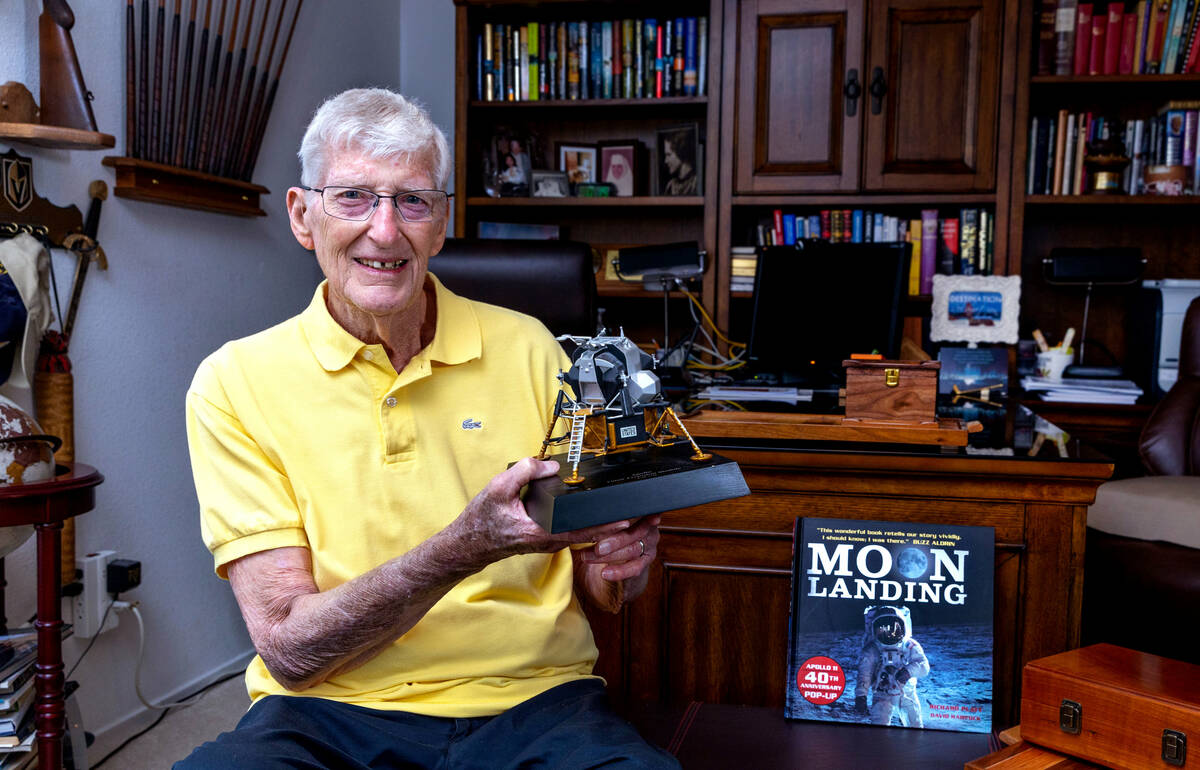‘It can kill you’: Retiree urges awareness of carotid artery disease
John Davis’ resume includes serving as a test engineer of radar systems on the Apollo modules that went to the moon. The retired engineer knows firsthand about the value of testing, minding details and solving problems.
So, when an otherwise routine medical test revealed that Davis’ carotid arteries were severely blocked, he wasted no time taking care of it through a procedure called transcarotid artery revascularization.
TCAR is designed to treat blockages in the carotid arteries with less risk of perioperative stroke, heart attack or nerve damage than other procedures.
Now Davis, 84, is committed to sharing his story and encouraging others to be tested for carotid artery disease, which can lead to stroke, disability and death, even while — as in Davis’ case — it may display no symptoms.
A disease with no symptoms
The carotid arteries carry blood from the heart through the neck to the brain, said Dr. Eddy H. Luh, a board-certified vascular surgeon at Vegas Vascular Specialists and chief of surgery at Valley Hospital Medical Center. Carotid artery disease occurs when there is a narrowing or obstruction along that blood flow, Luh explained.
The reduced blood flow can cause a stroke, in which the brain becomes starved for oxygen. Or bits of plaque may break off, travel to the brain and cause a stroke. Or the plaque deposits could create arterial blockages in the heart and legs.
“Stroke is one of the three leading causes of death in the United States,” Luh said. About one-third of stroke patients die within 30 days, a third suffer some sort of permanent disability, and a third recover completely, the vascular surgeon said.
Unfortunately, carotid artery disease usually has no symptoms and is typically discovered only when a primary care doctor orders a routine ultrasound screening because of a patient’s risk factors.
“Unfortunately, upward of 80 percent of the time … the first symptom is a stroke,” Luh said of carotid artery disease.
If an ultrasound screening detects possible arterial narrowing, then a more precise test, a CT angiogram of the neck, may be administered.
Generally, carotid arterial blockages of less than 60 percent are treated with blood-thinning medications and therapy, Luh said. For more significant blockages, surgery is typically recommended.
Reducing surgical risks
During a surgical procedure called a carotid endarterectomy, or CEA, an incision is made in the neck and a surgeon “goes down the artery to tease the plaque out,” Luh said.
One risk of CEA is that debris may escape, flowing to the brain and potentially causing a perioperative stroke. According to Luh, CEA has a stroke risk of about 2.5 percent when done by a board-certified vascular surgeon.
Also with CEA, the neck incision carries a 6 to 9 percent risk of damaging cranial nerves, including those associated with the vocal cords, the tongue and the ability to swallow, Luh said.
TCAR aims to reduce those risks. It uses a technology that temporarily reverses blood flow away from the brain as the blockage is cleared and a stent is placed to open the artery, reducing the risk of plaque traveling to the brain and causing a perioperative stroke, Luh said.
And TCAR uses smaller incisions in different locations than in CEA, he said, reducing the risk of nerve damage.
TCAR carries a less than 2 percent risk of stroke and a less than 1 percent risk of nerve injury, according to Luh. Most patients are hospitalized for one day, he added.
Undergoing TCAR
Davis said he felt some anxiety about having the procedure but is pleased with how it went.
“I woke up in recovery and I felt like it was before I went in,” he said. “I asked (a nurse), ‘Did we do the procedure?’ ‘Oh, it’s all done.’ ”
The blockages in Davis’ arteries were discovered during a routine primary care visit. When his physician suggested that he see a vascular specialist, Davis found Luh, who said that a CT angiogram revealed a blockage of almost 90 percent in Davis’ left carotid artery and more than 70 percent blockage in his right.
Davis had one TCAR procedure in late February 2020 and the second about six weeks later. Now he says he feels great.
“My brain is getting better blood flow. I asked Dr. Luh, ‘Will it make me smarter?’ He said no,” Davis joked.
The importance of screening
Luh said that he is the first physician in Nevada to perform TCAR, having first done the procedure in January 2020 at Valley Hospital.
He suggests that patients diagnosed with carotid artery disease discuss all of their options with their physician. Whether TCAR is the best solution depends on issues such as age, weight, location of the blockage and even a person’s neck anatomy, he said.
Davis encourages everyone to talk with their physicians about being screened for carotid artery disease.
He had no symptoms and no family history of stroke, he said. “That’s the whole thing about this, and that’s the message you have to get out to people: It’s life-threatening. It can kill you if you don’t take care of it.”
Being screened is particularly important for people who have vascular problems in other parts of their body. Carotid artery disease is a form of atherosclerosis — sometimes referred to as hardening of the arteries — “which is a systemic disease,” Luh said. It’s not uncommon for people with coronary heart disease or circulation problems in their legs or feet to suffer from arterial blockages elsewhere.
That was the case for Davis, who said that he later underwent procedures on both legs to address narrowed blood vessels.
Assessing CAD risk
Some of the factors that can put you at risk for carotid artery disease:
— Being older, especially for men.
— Diabetes.
— Family history of stroke or coronary artery disease.
— High blood pressure.
— High cholesterol.
— High triglycerides.
— Smoking.
— Alcohol use.
— Recreational drug use.
— Neck trauma.
Valley Health System























